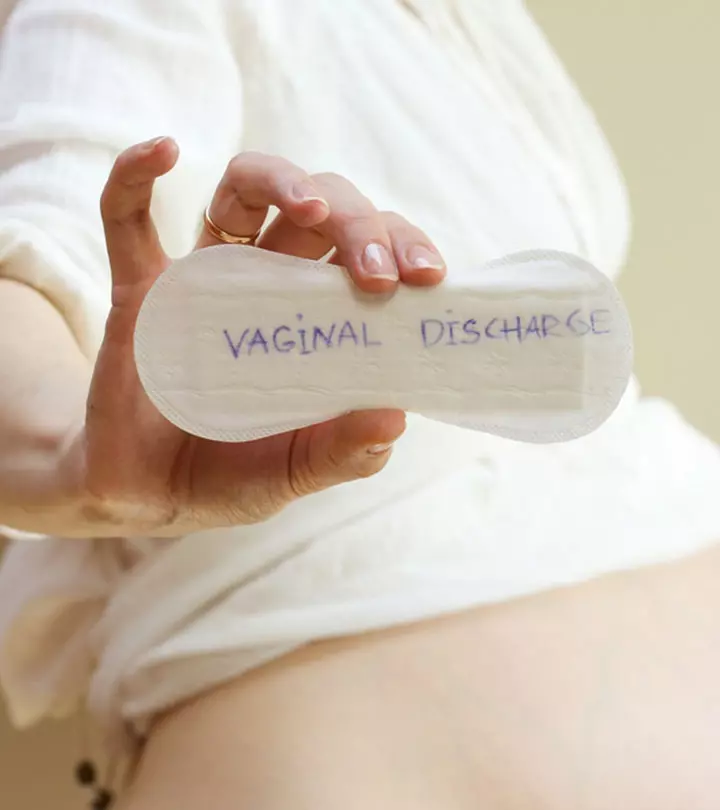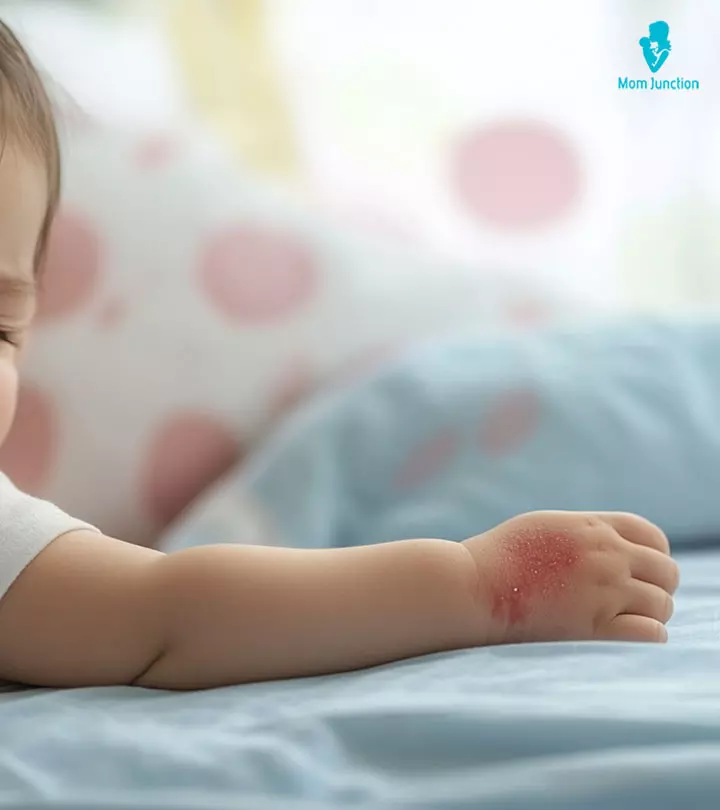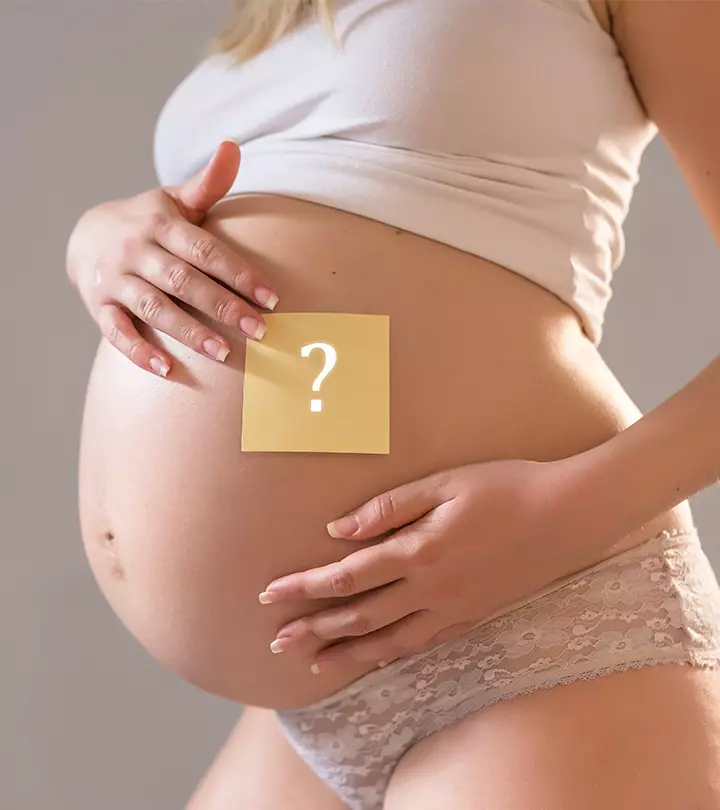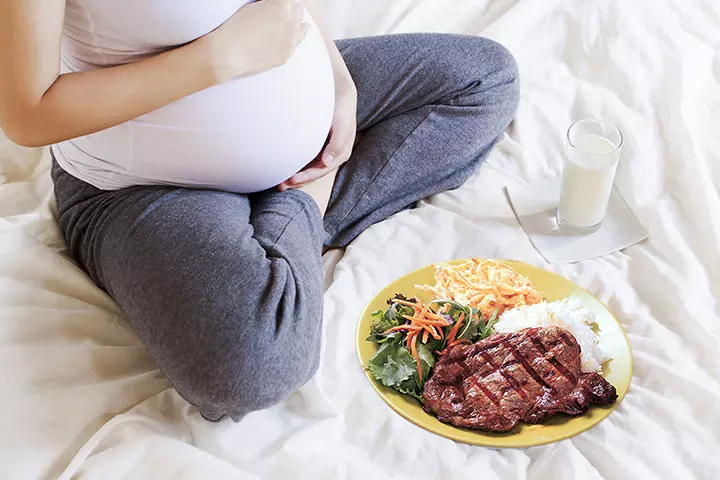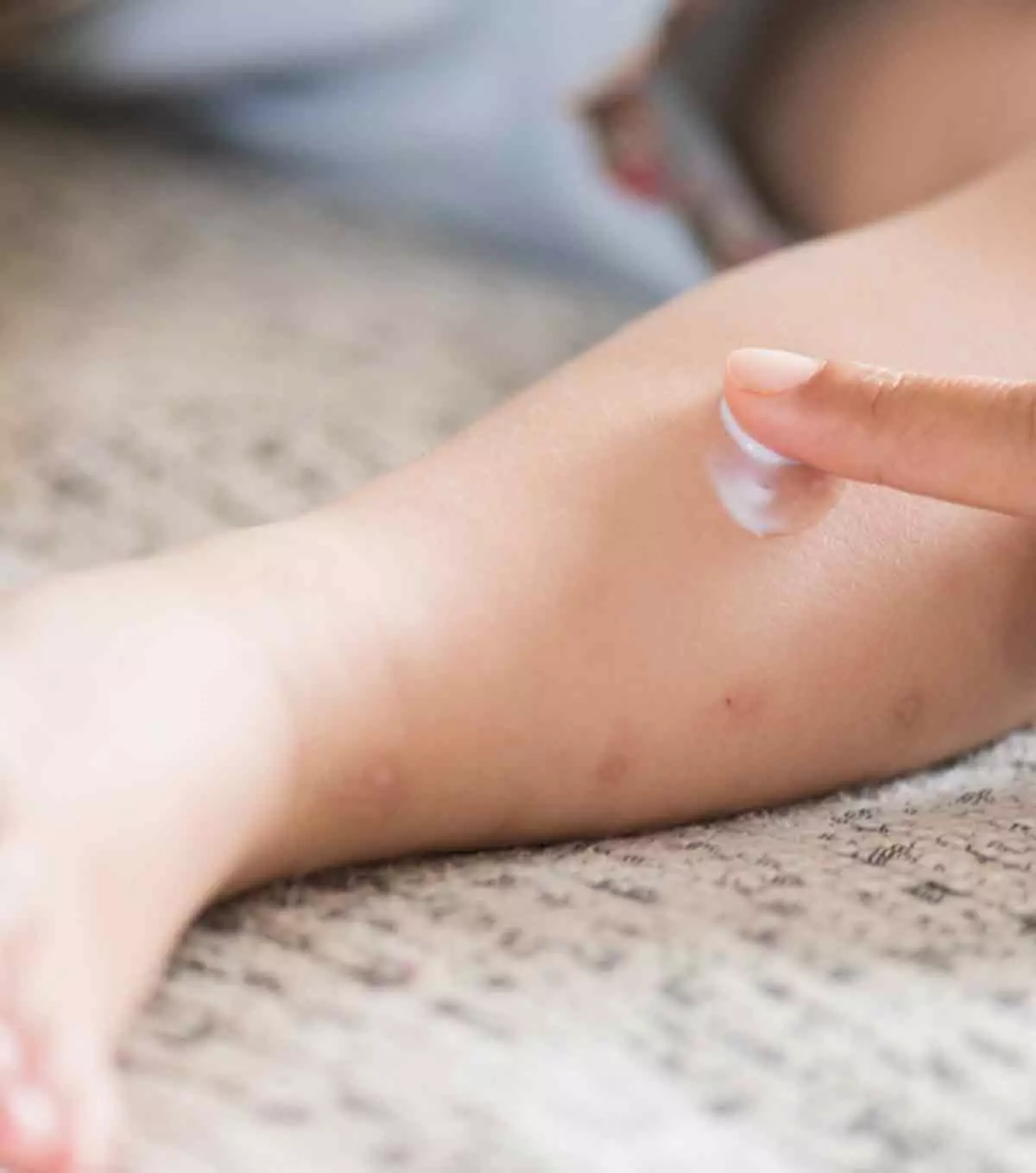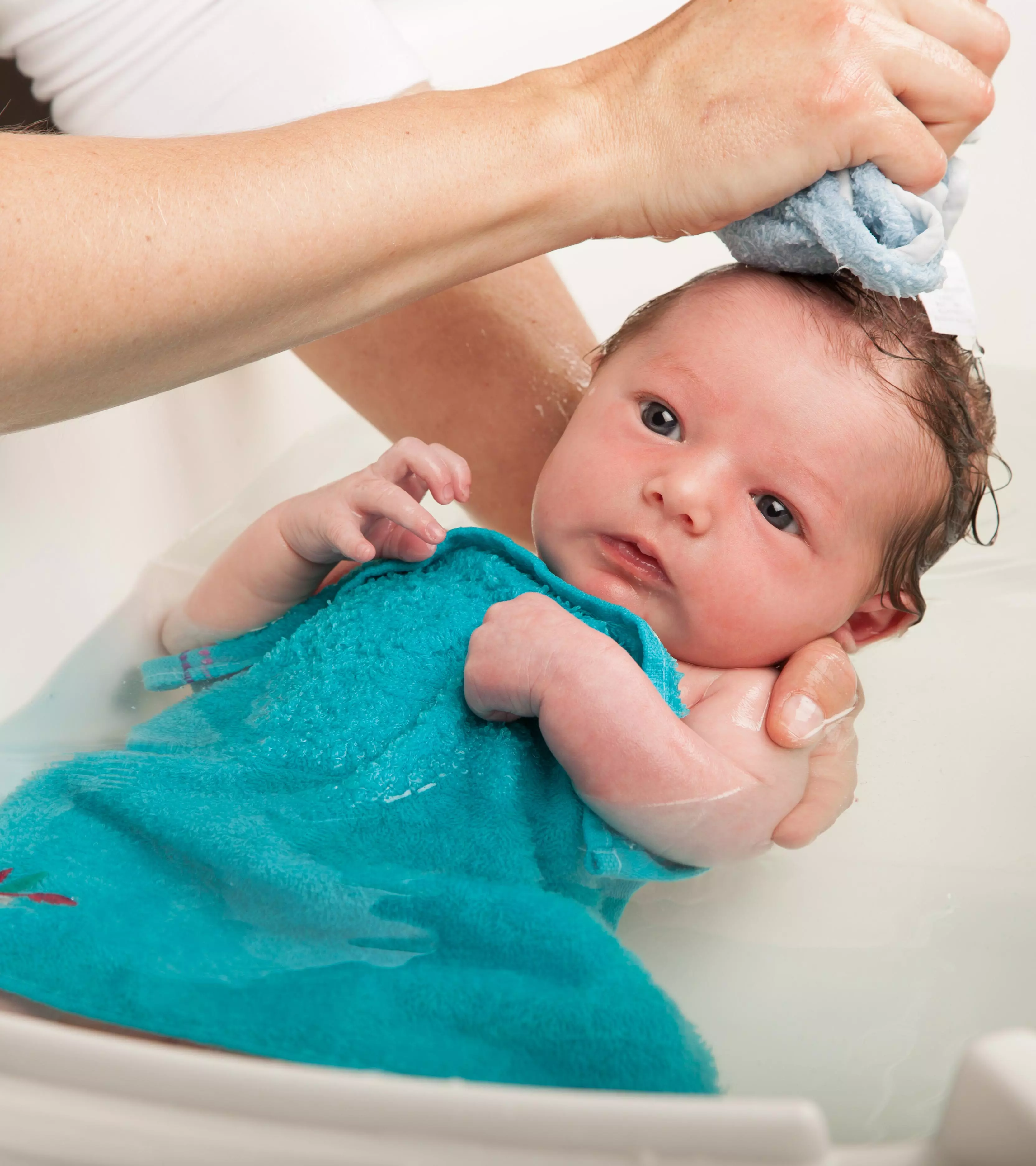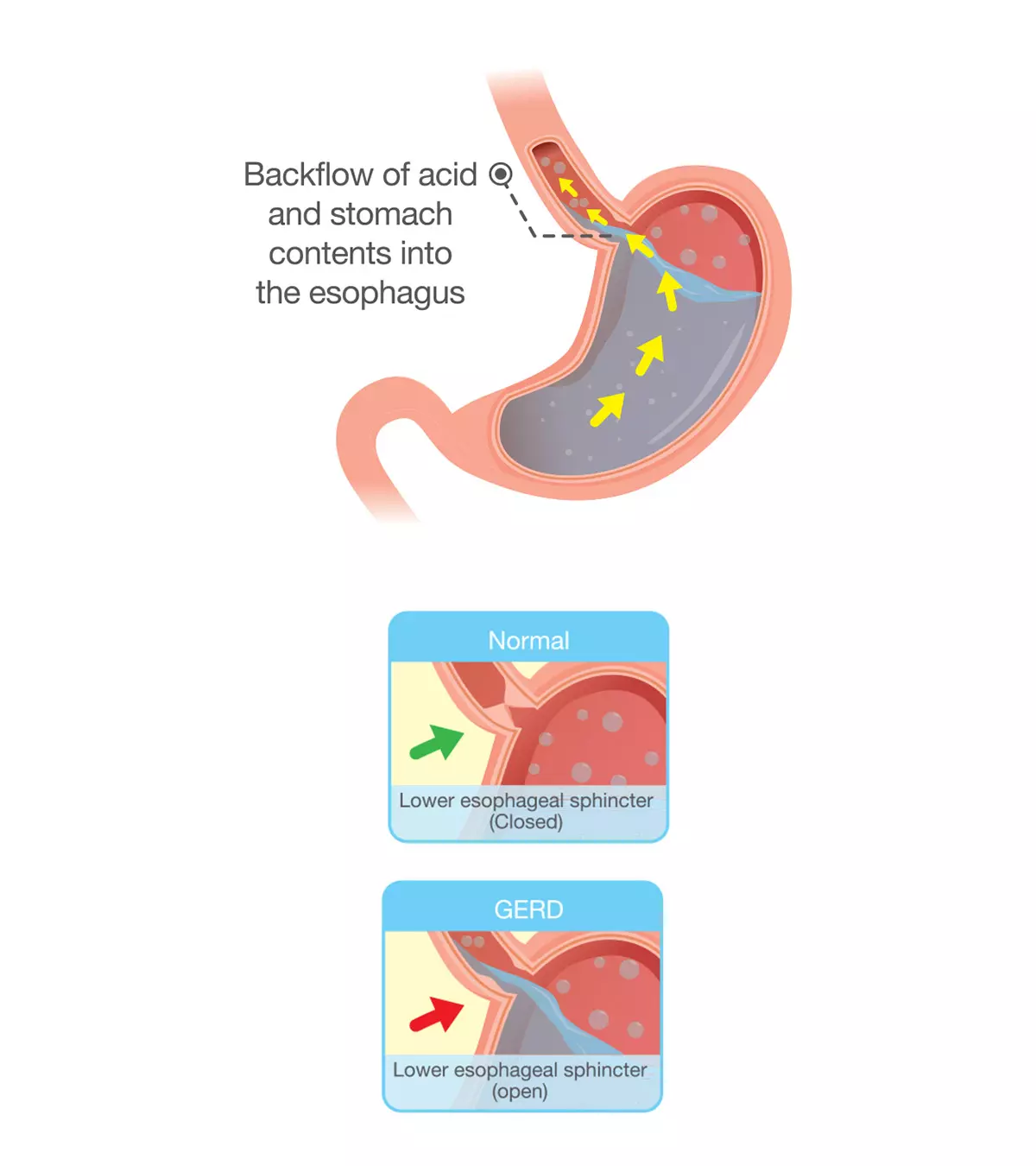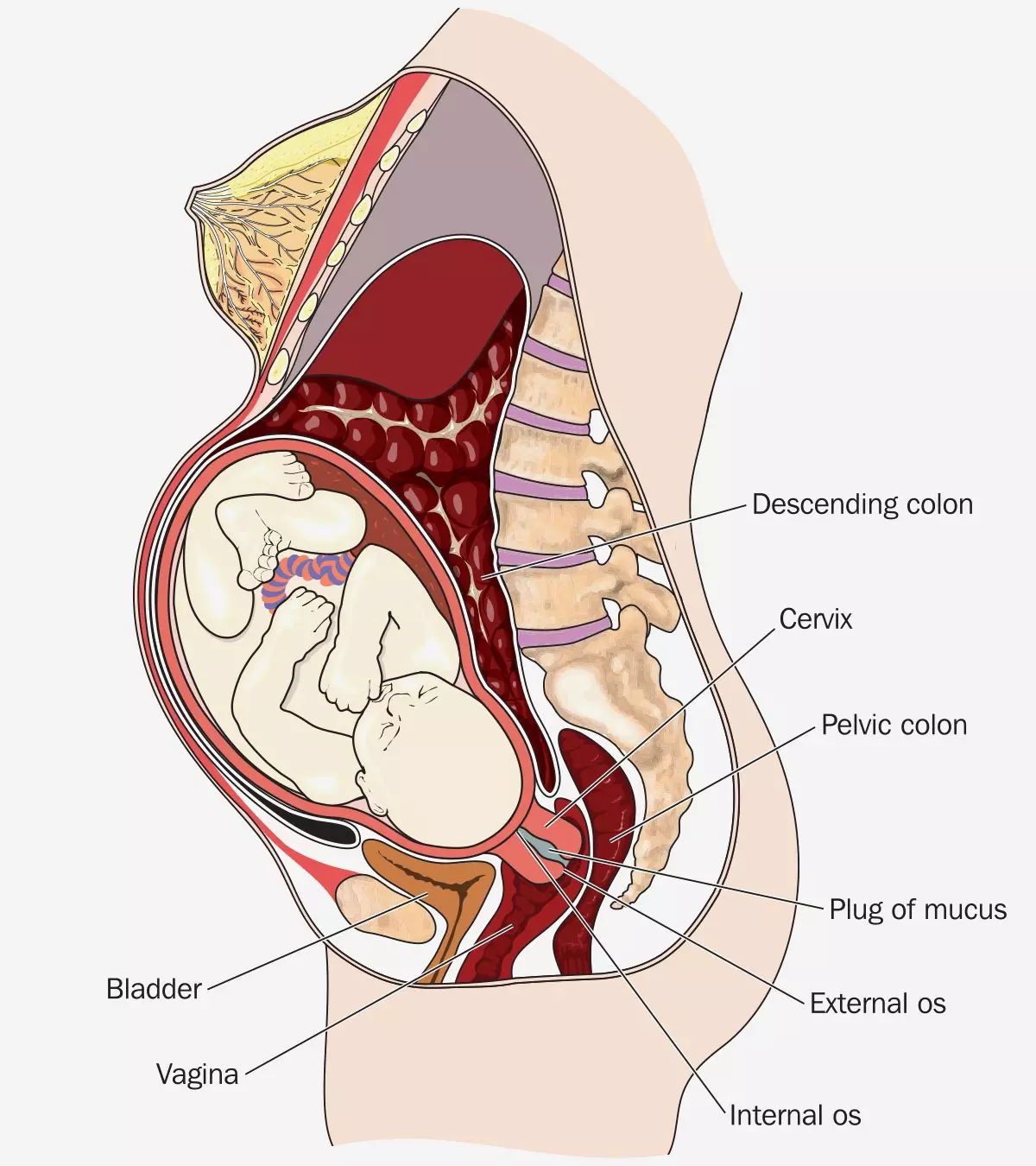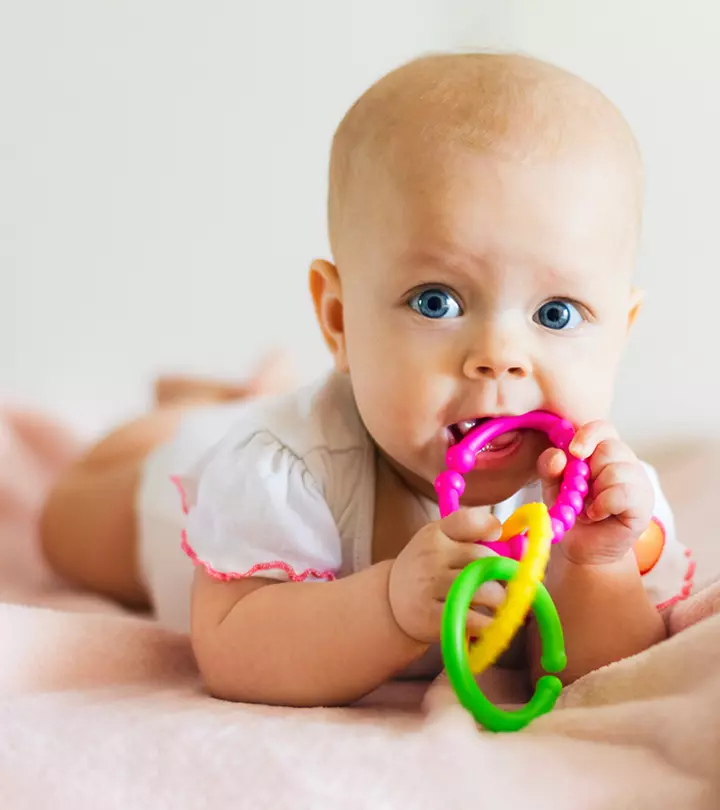
Image: iStock
Most babies develop their first teeth between four and seven months, but some may develop teeth as early as three months (1). Three-month-old teething is also called early eruption and is a rare condition. The early eruption’s exact cause and risk factors have not been identified, yet it is usually believed not to cause any concern.

The teeth that erupt at three months are not natal or neonatal but the primary ones that have developed earlier than usual. Stanford Children’s Health states that while teething symptoms, such as drooling and mouthing, may begin at three months, tooth eruption in most babies generally occurs later (2).
Read the post to learn about the signs, effects, and management of three-month-old teething.
Key Pointers
- Putting fingers or objects in the mouth, drooling, lack of appetite, sleep issues, and swollen gums can be the signs of teething in a three-month-old baby.
- Early teething is not associated with significant issues other than biting nipples while breastfeeding.
- Orthodontic pacifiers, chilled teething toys, clean washcloths, or massage can help to reduce teething pain in babies.
Signs Of Teething In Three-Month-Old Babies
The following signs may indicate teething in a three-month-old (2) (3).
- Excessive drooling
- Putting fingers and objects in the mouth
- Swollen gums
- Flushed cheeks
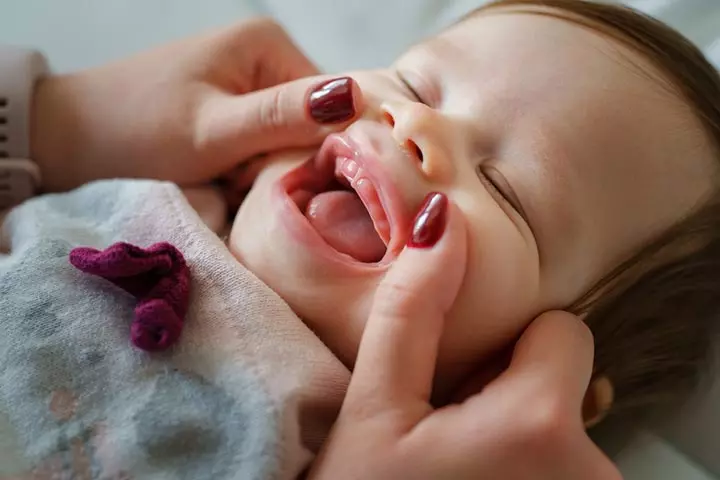
- Irritability and crying spells
- Pain on suckling (4)
- Loss of appetite
- Sleep deprivation
A study was conducted to identify the symptoms associated with teething in healthy infants. The report states,”Increased biting, drooling, gum-rubbing, sucking, irritability, wakefulness, ear-rubbing, facial rash, decreased appetite for solid foods, and mild temperature elevation were all statistically associated with teething. Congestion, sleep disturbance, stool looseness, increased stool number, decreased appetite for liquids, cough, rashes other than facial rashes, fever over 102°F, and vomiting were not significantly associated with tooth emergence (5).”
Effects Of Early Teething On The Mother’s And The Baby’s Health
Early teething does not have any remarkable effects. The effects of teething are similar at all ages, such as those mentioned below.
1. Impact on the mother
- The baby might chew or bite on the mother’s nipples to soothe their irritated gums.
- Avoid screaming or getting startled as they might find it funny. Instead, say “No biting” in a strict and firm tone. They will gradually get the message.
- If the baby continues to bite, you may consider pumping and feeding breastmilk in a bottle or using nipple shields.
2. Impact on the baby
- The baby might be irritable, cranky, and fussy.
- They may have sore gums and irritation, leading to reduced appetite, increasing the risk of poor weight gain.
- Baby pulling ears and rubbing cheeks often may be due to gum irritation.
- The baby may drool more than usual, and the excess drool could cause drool rash (5).
A mother and a blogger shares her experience about her son Mason’s teething when he was three months old. She writes, “I think my little guy may be teething. I did a little research and it seems that babies can start teething at 3 months. He’s drooling constantly and sucking on anything he can get in his mouth. I know babies like to suck on things anyway, but I tend to think it just might be teething (i).”
It is important to note that teething does not primarily cause cold, rash, diarrhea, or fever. If any of these symptoms coincide with teething, do not consider them related and take the baby to your pediatrician.

Tips On Easing A Teething Infant’s Discomfort
The following tips may help soothe teething-related gum pain in babies safely (2).
- Try giving them chilled teething rings, chilled or frozen vegetables or clean, cold teething toys to nibble on. Three-month-olds might not be able to grasp them well. Therefore, you may hold them for the baby. Avoid fluid filled teething rings as the liquid may spill out and cause toxicity. Dentist Dr. Frank Farrelly explains, “For chilled teething rings, make sure they are suitable for placement in the freezer. Some are not suitable for freezing and can release the gel inside, posing a hazard. Also, allow it time to normalize to room temperature on the outside, so it doesn’t stick to hands or lips, but the internal remains cool.”
- You can get teething mittens for your baby. The three-month-old may chew on teething mittens since they cannot hold teethers properly.
- You may also consider giving them a clean and cold washcloth to chew on.
- Use your clean index finger to massage the sore gums.
- You may give your baby an orthodontic pacifier that meets safety guidelines as it will help relieve toothache and not hamper the normal growth of jaws, oral muscles, and teeth (6).
- You can also give the baby cold applesauce or yogurt to ease the discomfort (7).
 Caution
CautionParents and caregivers use different remedies to relieve teething pain symptoms in babies and toddlers. The graph below shows that most parents use safe methods, such as toys, rings, and medications, to alleviate teething pain. However, some parents resort to unsafe methods like amber teething necklaces and topical anesthetics to relieve teething pain in babies and toddlers.

Safe and unsafe teething remedies reported by caregivers
Source: Use of Unsafe Teething Remedies: A Survey; Journal of the Canadian Dental AssociationThe US Food and Drug Administration (FDA)warns against the use of topical teething gels for babies as these products can be harmful. They also warn against the use of homeopathic teething tablets for babies as these too pose a risk due to their belladonna content (8). In rare cases, if the baby is in extreme teething pain, the doctor may prescribe baby-safe painkillers such as acetaminophen (9). Certain over-the-counter painkillers such as ibuprofen are not recommended for babies below six months. Hence, only give medicines prescribed by your pediatrician.
 Did you know?
Did you know?How To Take Care Of The New Teeth?
The American Dental Association suggests the following measures for oral care in babies (11) (12) (13).
- Clean the baby’s mouth using a clean washcloth even before the teeth begin to erupt.
- An early dental visit to the pediatric dentist must be done after the first tooth erupts and before the first birthday.
- As soon as teeth erupt, you must begin brushing your child’s teeth.
- Make sure to clean your child’s mouth after every feeding or at least twice daily.
- For babies and toddlers under three years old, use a small smear of toothpaste.
- Use small circular motions to brush, ensuring all tooth surfaces are thoroughly cleaned.

- Avoid giving pacifiers dipped in sweet solutions.
- Avoid bottle-feeding at night.
Caution:
Do not give the baby certain risky soothing toys such as teething necklaces, as they can easily break off and the baby may choke on the beads or the necklace may get caught on something and increase the risk of strangulation (9).
 Experts say
Experts sayFrequently Asked Questions
1. Does early teething mean I can introduce solids early?
No. Early teething does not warrant the need for the early introduction of solid food. The World Health Organization strongly recommends exclusive breastfeeding for up to six months of age (15).
2. Does early teething have anything to do with my baby’s intelligence?
A tooth’s eruption depends on the tooth germ (or tooth bud) in the jaws and has nothing to do with the baby’s smartness or intellect (4).
3. Does early teething impact mouth development?
Some babies may develop a habit of excessive thumb-sucking or pacifier-sucking when they are teething. If these habits form early due to early baby teething, it may lead to crooked or misaligned teeth in the long run. Speak to a pediatric dentist in case your baby is habituated to thumb- or pacifier-sucking.
4. What is the best way to soothe a teething baby at night?
Consider using a chilled teething ring or cold washcloth to numb the sore gums and reduce inflammation. Another effective technique is gently massaging the baby’s gums with a clean finger to apply soothing pressure. Also, create a calm, quiet sleep environment to help the baby settle more easily.
5. Can my baby show symptoms without tooth eruption?
Yes, the teeth may not appear even after the expected period of four to eight days after the symptoms of teething appear. Also, note that it is easy to confuse the symptoms of mouthing behavior with that of teething.
6. How long does teething last in a three-month-old?
Generally, teething can last up to eight days, which includes the four days before and the three days following the tooth’s eruption from the gum. Where the tooth is going to erupt, you might notice a blue-gray bubble on the gum. The condition is known as an eruption cyst, which often goes away on its own (16).
7. Do babies get sick when teething?
Teething can make a baby uncomfortable, but it is not usually associated with illness. Therefore, if your baby has symptoms such as coughing, rashes, diarrhea, vomiting, or fever, don’t consider it “just teething” and promptly consult a doctor (17).
A three-month-old teething is a rare occurrence and is termed as an early eruption. However, it is better to be alert and observant of signs, such as drooling, suckling pain, swollen gums, and increased fussiness which could indicate teething in a three-month-old. Some babies may also experience sleepless nights and poor appetite. If you notice these signs early on, you may contact your baby’s pediatrician or a pediatric dentist. Assessing your baby for early teething could help take appropriate measures to support timely oral care and soothe your teething baby.
Infographic: Tips To Soothe Sore Gums In Teething Infants
Teething may cause sore gums, making your baby irritable and fussy. The baby may drool excessively and have a reduced appetite. The infographic below provides effective tips to soothe sore gums caused by teething. Keep it handy for your use, or share it with new moms.
Some thing wrong with infographic shortcode. please verify shortcode syntaxIllustration: 3-Month-Old&039s Teething: Signs And Tips For Soothing Sore Gums

Image: Dall·E/MomJunction Design Team
Learn the signs of teething in your baby and discover practical ways to provide relief in this informative video for new parents. Help your little one through the teething process with ease!
Personal Experience: Source
MomJunction articles include first-hand experiences to provide you with better insights through real-life narratives. Here are the sources of personal accounts referenced in this article.
i. Mason – 3 Months;https://silverliningdecor.blogspot.com/2013/08/mason-3-months.html
References
- When Does Teething Start?
https://www.healthychildren.org/English/ages-stages/baby/teething-tooth-care/Pages/Teething-4-to-7-Months.aspx - Teething.
https://www.stanfordchildrens.org/en/topic/default?id=teething-90-P01873#:~:text=Teething%20is%20the%20process%20of - Baby teething symptoms.
https://www.nhs.uk/conditions/baby/babys-development/teething/baby-teething-symptoms/ - N Uma Maheswari et.al; (2012); “Early baby teeth”: Folklore and facts.
https://pmc.ncbi.nlm.nih.gov/articles/PMC3467875/ - Symptoms Associated With Infant Teething: A Prospective Study.
https://publications.aap.org/pediatrics/article-abstract/105/4/747/65718/Symptoms-Associated-With-Infant-Teething-A?redirectedFrom=fulltext - Teething.
https://www.seattlechildrens.org/conditions/a-z/teething/ - Teething tips and tricks.
https://vitalrecord.tamu.edu/teething-tips-and-tricks/ - FDA warns consumers about homeopathic teething products.
https://www.fda.gov/drugs/information-drug-class/fda-warns-consumers-about-homeopathic-teething-products - Safely Soothing Teething Pain in Infants and Children.
https://www.fda.gov/consumers/consumer-updates/safely-soothing-teething-pain-infants-and-children - Baby’s First Tooth: 7 Facts Parents Should Know.
https://www.healthychildren.org/English/ages-stages/baby/teething-tooth-care/Pages/Babys-First-Tooth-Facts-Parents-Should-Know.aspx - Baby Teeth.
https://www.mouthhealthy.org/all-topics-a-z/baby-teeth/ - Looking after your baby’s teeth.
https://www.nhs.uk/conditions/baby/babys-development/teething/looking-after-your-babys-teeth/ - Dental: Teeth and Gum Care for Infants and Toddlers.
https://www.nationwidechildrens.org/family-resources-education/health-wellness-and-safety-resources/helping-hands/dental-teeth-and-gum-care-for-infants-and-toddlers - Why It’s Important to Take Care of Baby Teeth
https://www.healthychildren.org/English/ages-stages/baby/teething-tooth-care/Pages/How-to-Prevent-Tooth-Decay-in-Your-Baby.aspx - Infant and young child feeding.
https://www.who.int/news-room/fact-sheets/detail/infant-and-young-child-feeding - Teeth development in children.
https://www.betterhealth.vic.gov.au/health/conditionsandtreatments/teeth-development-in-children#teething - Teething.
https://www.pregnancybirthbaby.org.au/teething#avoid
Community Experiences
Join the conversation and become a part of our nurturing community! Share your stories, experiences, and insights to connect with fellow parents.
Read full bio of Dr. Ashveeta Shetty
- Frank is the principal dentist and co-owner of Darlinghurst Dental, a modern dental practice in the heart of Darlinghurst, Australia. We offer a full-service dental practice, with a high emphasis on delivering evidence-based treatments with outstanding customer service. We use the latest technologies to improve speed, accuracy, and long term prognosis. This ensures that you get the best possible outcome from your dental treatment and that is easy, convenient, and comfortable for you.
 Frank is the principal dentist and co-owner of Darlinghurst Dental, a modern dental practice in the heart of Darlinghurst, Australia. We offer a full-service dental practice, with a high emphasis on delivering evidence-based treatments with outstanding customer service. We use the latest technologies to improve speed, accuracy, and long term prognosis. This ensures that you get the best possible outcome from your dental treatment and that is easy, convenient, and comfortable for you.
Frank is the principal dentist and co-owner of Darlinghurst Dental, a modern dental practice in the heart of Darlinghurst, Australia. We offer a full-service dental practice, with a high emphasis on delivering evidence-based treatments with outstanding customer service. We use the latest technologies to improve speed, accuracy, and long term prognosis. This ensures that you get the best possible outcome from your dental treatment and that is easy, convenient, and comfortable for you.
Read full bio of Dr. Ritika Shah
Read full bio of Rohit Garoo
Read full bio of Vidya Tadapatri






